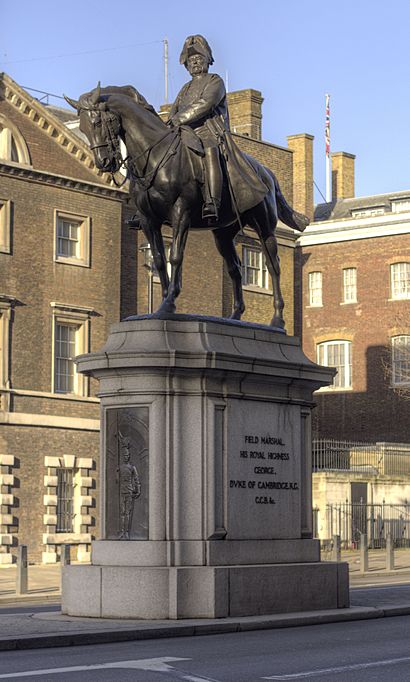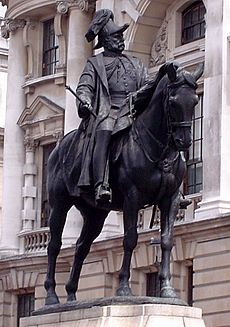Equestrian statue of the Duke of Cambridge, Whitehall facts for kids
Quick facts for kids 
The statue in 2008
|
|
| Artist | Adrian Jones |
|---|---|
| Completion date | 18 May 1907 |
| Type | Sculpture (Equestrian statue) |
| Subject | Prince George, Duke of Cambridge |
| Location | London, SW1 United Kingdom |
| 51°30′19″N 0°07′36″W / 51.505234°N 0.126613°W | |
The equestrian statue of Prince George, Duke of Cambridge is a life-size statue made by Adrian Jones. You can find it in Whitehall, London. An equestrian statue means it shows a person riding a horse.
Contents
History of the Duke's Statue
Planning the Memorial
Prince Arthur, Duke of Connaught and Strathearn led a group that wanted to build a statue for his cousin, Prince George, Duke of Cambridge. Architect John Belcher and sculptor Adrian Jones worked together on this project.
In 1905, Belcher first suggested placing the statue outside Horse Guards on Whitehall. This idea was approved by the Westminster City Council.
Creating the Sculpture
In July 1906, Adrian Jones was sculpting the statue in his studio. Queen Alexandra visited him there. She was with her daughter Princess Victoria and other royal family members.
Choosing the Location
By October 1906, the committee changed their minds about where the statue should go. A new War Office building had just opened. They asked to place the statue outside this new building instead. This new location was also approved.
Building the Base
A company called Pethick Brothers built the statue's base, called a plinth. It was finished on May 18, 1907. They used 45 tonnes of granite for the plinth. The statue and its base together were expected to be about 25 feet (7.6 m) tall.
The statue was put on top of the plinth during the night. It was then covered up until its official unveiling.
The Unveiling Ceremony
The statue was officially revealed on June 15, 1907. King Edward VII unveiled it. He traveled from Buckingham Palace with a group of 2nd Life Guards.
Queen Alexandra, Princess Victoria, and other royal family members were also there. Many military people attended the ceremony. This included members of the German Army, as the Duke had been an honorary colonel for one of their regiments.
During the ceremony, the King said the statue was given to the care of the City of Westminster. However, the statue was actually owned by the Office of Works. After about two weeks, the two offices agreed that the Office of Works would keep ownership.
Design of the Statue
Adrian Jones sculpted the Duke of Cambridge riding a horse. The Duke is shown wearing his full uniform as a Field Marshal. You can see his medals, including four orders of knighthood.
The sculpture holds a baton in one hand. This baton was meant to look like the one given to the Duke's father by King William IV. In the other hand, the Duke holds the horse's reins.
On the sides of the plinth, there are two bas-relief panels. These panels show the Duke's connections with the Grenadier Guards and the 17th Lancers.
See also
 In Spanish: Estatua ecuestre del duque de Cambridge (Whitehall) para niños
In Spanish: Estatua ecuestre del duque de Cambridge (Whitehall) para niños
 | James Van Der Zee |
 | Alma Thomas |
 | Ellis Wilson |
 | Margaret Taylor-Burroughs |


